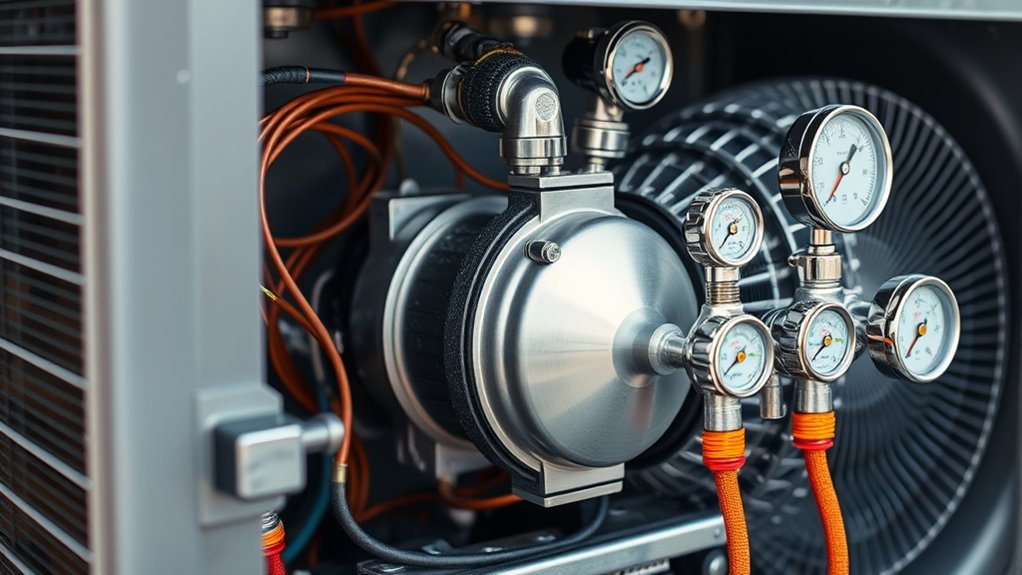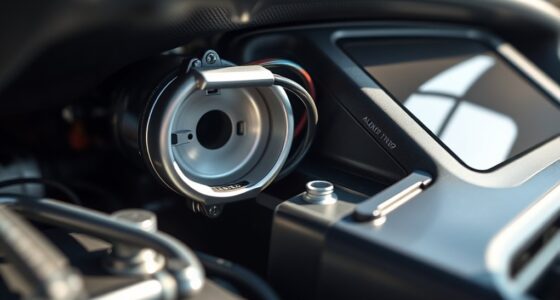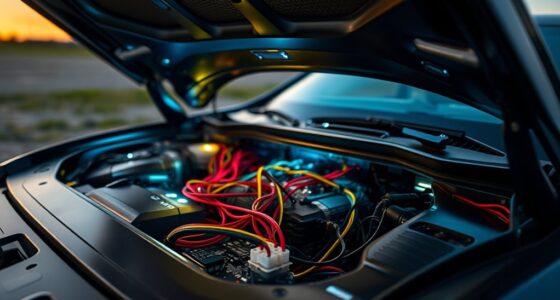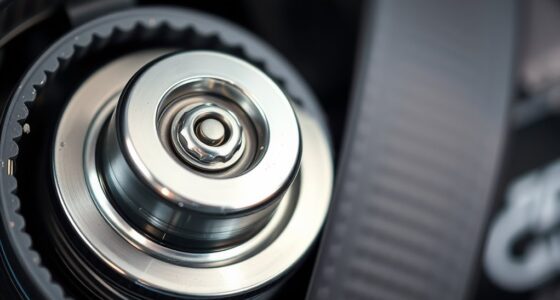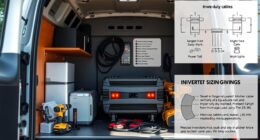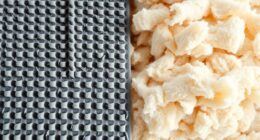If your AC isn’t cooling, start by checking the compressor outside to see if it runs smoothly and listen for strange noises. Inspect the condenser coils for dirt or debris that could block airflow and cause overheating. Make sure the condenser fan motor is operating properly and free of obstructions. Also, look for signs of refrigerant leaks, such as oily spots or ice buildup on copper lines. For detailed tips, continue exploring how to identify and fix these common issues.
Key Takeaways
- Verify the compressor runs smoothly and listen for unusual noises; ensure electrical connections are secure.
- Clean the condenser coils thoroughly and ensure unobstructed airflow around the unit.
- Check if the condenser fan motor operates correctly and spins freely to prevent overheating.
- Look for signs of refrigerant leaks, such as oily spots or ice buildup on copper lines.
- Contact licensed professionals for refrigerant refilling and leak diagnosis; avoid DIY refrigerant handling.
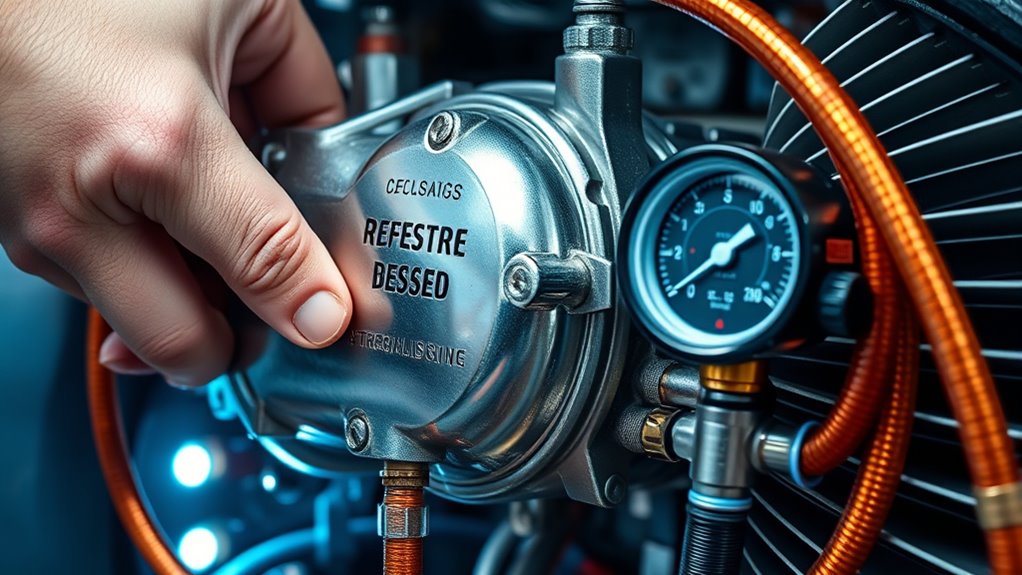
Noticing that your air conditioner isn’t cooling properly can be frustrating, especially during hot days. When your AC runs but fails to produce cold air, the problem might lie within the compressor, condenser, or refrigerant system. These components are essential for cooling, and any malfunction can considerably impact performance.
Start by checking the compressor, which is often located outside in the condenser unit. If it’s not running or makes strange noises, it could be the culprit. Ensure that the compressor’s electrical connections are secure and that the unit isn’t tripped by a breaker or fuse. Sometimes, a simple reset can get things working again, but if the compressor still doesn’t activate, it might be faulty or in need of professional repair.
Check if the outdoor compressor runs and is free of electrical issues or strange noises.
Next, examine the condenser coil, which releases heat from the refrigerant. If the coil is dirty or blocked by debris, the system can’t effectively expel heat, causing the cooling process to weaken. Turn off the power, then carefully clean the coil with a garden hose or a coil brush to remove dirt, leaves, or dust. Make sure there’s plenty of airflow around the unit; obstructions can lead to overheating and compressor failure.
If cleaning doesn’t improve cooling, the condenser fan motor could be malfunctioning. Listen for unusual noises or check if the fan blade spins freely. A faulty fan motor can prevent proper heat dissipation, so consider replacing it if needed.
The refrigerant is another critical element. Low refrigerant levels often cause inadequate cooling, but refilling it isn’t a DIY job—handling refrigerant requires specialized training and equipment due to safety and environmental concerns. If you suspect a refrigerant leak, look for oily spots or ice buildup on the copper lines. Properly maintaining refrigerant levels is vital for efficient AC operation.
Never attempt to add refrigerant yourself; instead, contact a licensed technician who can diagnose leaks, recharge the system properly, and ensure everything operates safely. Keep in mind that refrigerant issues often originate from leaks or improper manufacturing, and ignoring them can lead to compressor damage or system failure.
Frequently Asked Questions
Can a Dirty Air Filter Cause the AC Not to Cool?
Yes, a dirty air filter can cause your AC not to cool properly. When the filter is clogged, it restricts airflow, making your system work harder and less efficiently.
This reduced airflow prevents cool air from circulating effectively, leading to warmer indoor temperatures. Regularly changing or cleaning your air filter helps maintain proper airflow, ensuring your AC cools your space effectively and operates efficiently.
How Often Should I Service My AC for Optimal Cooling?
Think of your AC as a trusted friend who keeps you comfortable. To keep it performing at its best, you should schedule professional servicing at least once a year, preferably before the hot season hits.
Additionally, change filters every 1-3 months and clean the outdoor unit regularly. This routine care guarantees your system runs smoothly, saves energy, and keeps your home cool and inviting when you need it most.
Does High Outdoor Temperature Affect AC Cooling Performance?
Yes, high outdoor temperatures can affect your AC’s cooling performance. When it’s very hot outside, your unit works harder to cool your indoor space, which can reduce efficiency and cause it to struggle.
To keep your AC running smoothly, make sure your outdoor condenser is clean, and consider shading it from direct sunlight. Proper maintenance helps your system handle extreme heat better and maintains ideal cooling.
Can a Faulty Thermostat Impact Cooling Efficiency?
A faulty thermostat can definitely impact your cooling efficiency—think of it as trying to steer a ship with a broken compass. When your thermostat malfunctions, it either turns the AC on or off at the wrong times, causing uneven cooling or energy waste.
You might notice your home isn’t as cool as it should be or that your system runs constantly. Replacing or repairing the thermostat restores accurate temperature control and improves comfort.
Is Refrigerant Recharging a DIY or Professional Job?
Refrigerant recharging is best left to professionals. Handling refrigerant involves special equipment and safety precautions, and improper recharging can cause damage or leaks.
If your AC isn’t cooling properly, don’t attempt to recharge it yourself; instead, contact a licensed technician. They’ve the expertise to diagnose the problem accurately, ensure the correct refrigerant type and amount, and manage the process safely and effectively, protecting both your system and your health.
Conclusion
Remember, a stitch in time saves nine. If your AC isn’t cooling, checking the compressor, condenser, and refrigerant can save you from bigger headaches. Regular maintenance ensures your system runs smoothly and keeps you comfortable. Don’t wait until it’s too hot to act—address issues early and enjoy a cool, revitalizing space. By staying attentive, you’ll keep your AC in top shape and stay ahead of costly repairs. Stay proactive and beat the heat!
